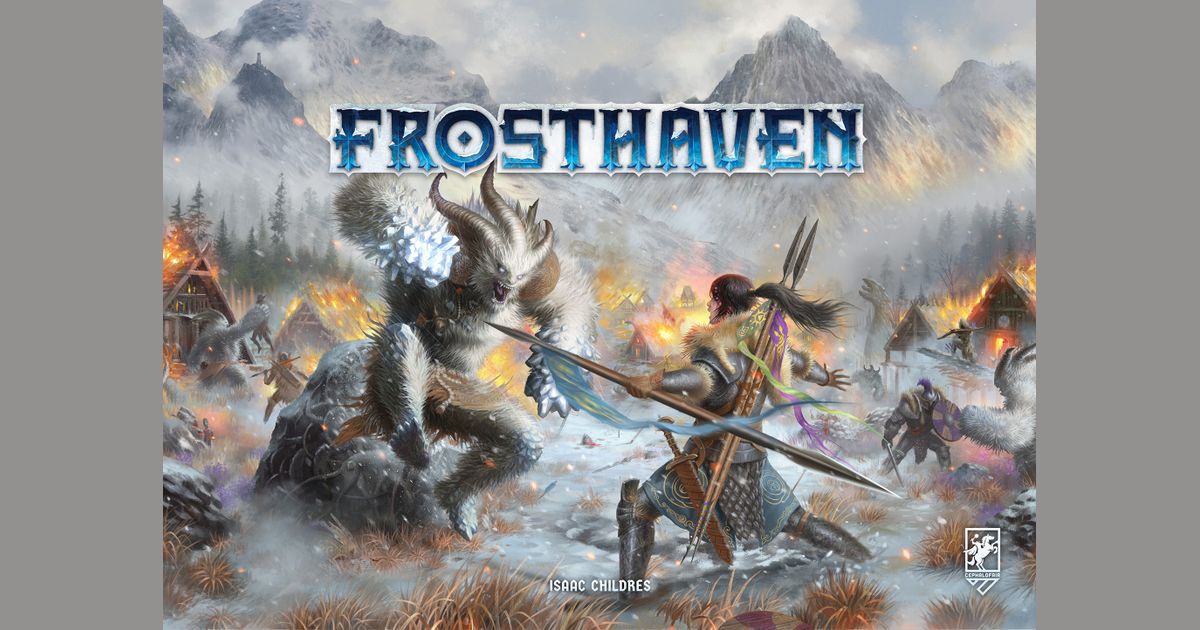
• In late November 2022, The New Yorker profiled designer Isaac Childres in an article by Sean Michaels titled “A Board-Game Auteur Makes His Next Move”, an article that exudes fabulous New Yorker-isms such as these:
— “Childres, who has a slight and somewhat owlish figure, and the squint of a medieval illuminator…”
— “In September of that year, he unveiled Gloomhaven, a Brobdingnagian fantasy game that fit inside a twenty-two-pound box the size of a microwave.”
— “In December of 2019, Childres announced Gloomhaven‘s official sequel: Frosthaven. It is roughly the weight and height of an Icelandic sheepdog — around fifty per cent longer and fifty per cent heavier than its predecessor, and requiring about three hundred hours to complete.”
— “Serious board-game players are a culture unto themselves. They favor novelty over tradition, mechanics over aesthetics, the ingeniousness of a puzzle over immediate ease of play. Enthusiasts open their own cafés, stage their own conventions, and invariably log into a Web site regrettably (but fairly) named BoardGameGeek.”
Fair indeed, although The New Yorker‘s abbreviation choice of “B.G.G.” is odd.
/pic2437871.jpg)
This detail is nice to know: “During the past seven years, Childres’s company, Cephalofair Games, has sold more than half a million copies of Gloomhaven and grown to have four full-time employees.” BGG users have logged 85,903 copies as owned, which is one-sixth of that total. Gloomhaven: Jaws of the Lion has sold “nearly as well as the original”, with 55,081 copies owned by BGGers.
I really appreciate the compact worldbuilding in the article’s final paragraph:
Quote:
When asked about all these course corrections, Childres said, “You’re not perfect. You don’t have complete information. Sometimes you need to listen to other people, and change.” As Childres introduces Frosthaven to his waiting fans, he’s learning that even the most calculating board-game players can be surprised — or even upended — by a move. Frosthaven is dedicated to Isaac’s older brother, Joseph, who died two years ago in a drug-related accident. Childres lives closer to his parents now; sometimes he takes his kayak to the ocean and hopes to see an otter. It is difficult to minimize randomness in a life on this Earth — but you can adapt to it, take steps. Frosthaven started shipping earlier this month; on B.G.G., it had an initial rank of 4,034.
/pic3536616.jpg)
• Deadline reports that Terraforming Mars has been optioned for a screen adaptation. Here’s an excerpt from Peter White’s article:
Quote:
The company is leaning towards a series but is also open for a feature take on the strategy game, which sees players compete to use resources and innovative technology to make the red planet inhabitable…
It hopes that the Terraforming Mars narrative can highlights the game’s themes including existential tropes like class struggle, colonialism, and ecological collapse.
BGG lists 115,641 copies of Terraforming Mars as being owned by BGGers, which is roughly 8% of total sales.
• On the German program Wetten, dass…? (roughly “You bet that…”), Holger Siebenich is challenged to defend his claim that he can identify Spiel des Jahres winners solely by listening to the components being poured out. Can he identify four of the five games correctly? Watch here.
:strip_icc()/pic7209854.png)
Screenshot from the video
Maybe someone can arrange a similar challenge for future conventions…
/pic219874.jpg)
• Researchers have created an AI agent that excels at playing Diplomacy. Here’s the abstract from an article that the researchers posted on Science:
Quote:
Despite much progress in training AI systems to imitate human language, building agents that use language to communicate intentionally with humans in interactive environments remains a major challenge. We introduce Cicero, the first AI agent to achieve human-level performance in Diplomacy, a strategy game involving both cooperation and competition that emphasizes natural language negotiation and tactical coordination between seven players. Cicero integrates a language model with planning and reinforcement learning algorithms by inferring players’ beliefs and intentions from its conversations and generating dialogue in pursuit of its plans. Across 40 games of an anonymous online Diplomacy league, Cicero achieved more than double the average score of the human players and ranked in the top 10% of participants who played more than one game.
For anyone who lives by the credo of longtermism, this paragraph (with italics added) might give you the willies:
Quote:
Cicero uses a strategic reasoning module to intelligently select intents and actions. This module runs a planning algorithm that predicts the policies of all other players based on the game state and dialogue so far, accounting for both the strength of different actions and their likelihood in human games, and chooses an optimal action for Cicero based on those predictions. Planning relies on a value and policy function trained via self-play RL [reinforced learning] which penalized the agent for deviating too far from human behavior in order to maintain a human-compatible policy. During each negotiation period, intents are re-computed every time Cicero sends or receives a message. At the end of each turn, Cicero plays its most recently computed intent.
Must remain human compatible at all times! Then no one will suspect a thing…although the paper does include this comment:
Quote:
Although Cicero is shown to be effective at cooperating with humans, it occasionally sent messages that contained grounding errors, contradicted its plans, or were otherwise strategically subpar. Although we reduced errors with a suite of filters, Diplomacy poses an interesting benchmark for studying this problem. We suspect that these mistakes did not raise further suspicions that Cicero was an AI agent due to the time pressure imposed by the game, as well as the fact that humans occasionally make similar mistakes.
I also burnt my toast yesterday morning! Ha ha, what a human thing to do!
One kicker in the study’s closing notes: “All funding was provided by Meta.”
CreditSource link






